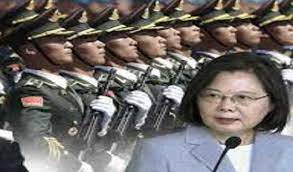Taipei, Oct 10: Taiwan on Monday marked the “Double Ten” or 10 October, the self-ruled island’s national day.
The annual celebration is especially significant this year — tensions with Beijing, which claims Taiwan as its territory, are at an all-time high, reports BBC.
China’s leader Xi Jinping, who has been particularly vocal about “re-unification”, is set to get a third term at a historic Communist Party meeting next week.
Ironically, 10 October has nothing to do with Taiwan or any moment in its history. It, in fact, marks the day in 1911 when an uprising began in Wuchang in central China that eventually led to the collapse of the last imperial dynasty — and the establishment of the Republic of China.
So why is Taiwan celebrating the day? Because the island’s official name is still The Republic of China on Taiwan. The flags flying across Taipei today are still of the white star on a blue and red background.
It is a peculiar legacy of the Chinese civil war. In 1949, the defeated nationalist regime of Chiang Kai-shek fled across the Taiwan strait to Taipei. For decades Chiang held Taiwan in an iron grip, while continuing to proclaim his regime “the true democratic government of Free China”, the BBC reported.
Today all of this seems slightly absurd — and for so many Taiwanese, especially the younger generation, it is.
Opinion polls this year suggest that 70to 80 per cent of people here now consider themselves “Taiwanese”. That is a significant increase from a decade ago, when around half the population still said they were “Chinese”.
This trend has not gone unnoticed in Beijing, and it is retaliating, the report said.
Around half of the island’s population now supports formal independence, even under threat of attack from China. A poll last year showed 75 per cent of Taiwanese say they would fight a Chinese invasion.
(UNI)
Trending Now
E-Paper


